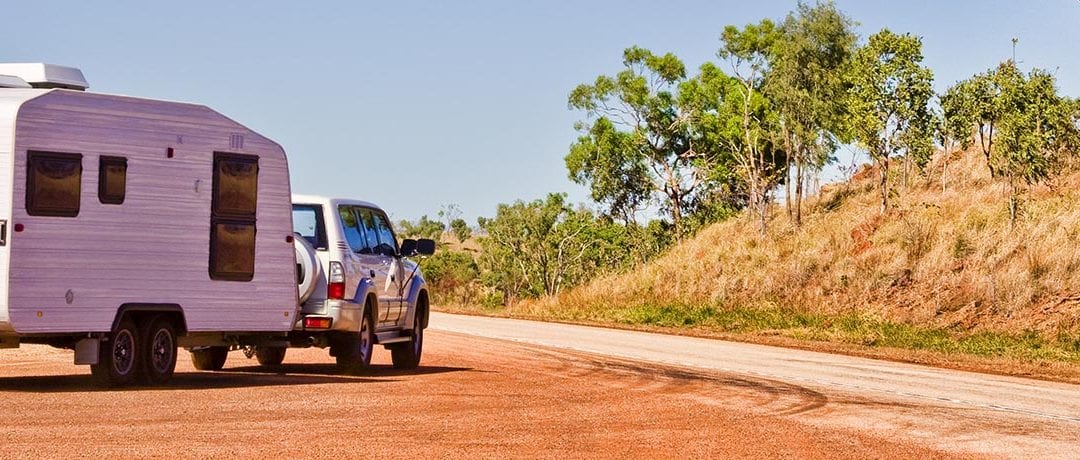We’ve all heard them. From mates, on the internet, well-meaning travellers – but not all ‘tips’ are correct. We answer the most common towing myths.

All safety features such as Electric Brake Controllers, Break Away Systems and Electronic Stability control are optional.
FALSE
Some of these are legally required to tow your caravan or camper trailer.
Electric Brake Controllers – Anything, including trailers, horse floats, boat & trailers and caravans, which exceed the 750kg GTM limit legally require having an efficient braking system on at least one axle. It is also a legal requirement that all caravans, trailers and floats exceeding 2000kg (GTM) are fitted with an efficient braking system on all wheels.
Breakaway Systems – It is a legal requirement that every trailer over two tonnes GTM must have brakes operating on all wheels. The brake system must cause an immediate application of the trailer brakes in the event of the trailer becoming detached from the towing vehicle and the brakes must remain applied for at least 15 minutes. Requirements can vary from state to state so we would recommend reviewing the laws relevant to you before travelling with your caravan.
Electronic Stability Control – While it is not a legal requirement to have ESC installed on your caravan it is something we highly recommend to all caravan owners. Getting an ESC system installed on your van is one of the best things you can do to increase your safety on the road when towing. These systems are your best defence against that terrifying caravan sway. They are known to be so effective that many caravan insurers will offer discounted premiums if you have ESC fitted to your caravan. Many new model caravans will have ESC installed as standard, but it is also possible to retrofit these units to older caravans as well.
For more info on ESC check out this post: Caravan ESC: What Is It and Why Should You Get It?
When the caravan starts to sway accelerating will correct it.
FALSE
A very common caravan towing myth, most people would suggest accelerating to get out of a sway, but this is actually not the best course of action. Speeding up usually will only work if your vehicle has the power/torque to effectively do so. If your vehicle doesn’t have enough power, accelerating may cause the trailer to sway even further possibly causing the driver to lose control altogether.
The best option is to avoid the situation where possible by having an electronic stability control system installed on your caravan.
Setting rear brakes to lock up first will assist stability in emergencies.
FALSE
The brakes are at their most effective just prior to locking, but once locked, the friction between the tyre and road decreases rapidly. The caravan is far more likely to jack-knife.
5-amp power leads are impractical – Simply file down the earth pin so it fits into the standard household power point.
VERY FALSE
It is illegal to directly connect a Recreational Vehicles’ 15 Amp electrical system to a 10 Amp domestic socket. Further to this, connecting the power in this way will also invalidate insurance.
Recreational Vehicles are designed to be connected to dedicated 15A power outlets like those provided in caravan parks. The appliances inside the Recreational Vehicle may still operate below 10A, but the current draw increases as more appliances (air conditioner, fridge, hairdryer, lights, etc.) are switched on.
Maintain speed when being overtaken by a truck.
TRUE
When being overtaken by any large vehicle, the air that is displaced by that vehicle has the potential to upset the caravan. To reduce the likelihood of this happening, maintain speed, which will effectively stretch out the vehicle – van combination thus keeping the van under more control.
Tyres only need to be replaced when they have the minimum tread left.
FALSE
Many people believe that caravan tyres can last for longer because they aren’t on the road as much as regular vehicles. The main issue with older tyres is that as rubber ages, it hardens. Then, as the tyres heat up, instead of having their usual flexibility, the hardened rubber will crack and potentially blow out. It is recommended that your caravan tyres should be replaced every six years to prevent this from happening.
Caravan towing mirrors aren’t needed if a camera is fitted to the back of the van.
FALSE
This one can often cause a bit of confusion, but the law states that you need to have towing mirrors in order to see behind your caravan. The main source of confusion is around how far behind the caravan you should be able to see. If your vehicle has large side mirrors and your caravan’s width is less than your vehicle, then you may not need extension mirrors. A camera is a great addition to any arsenal of towing equipment (we highly recommend them) but it should be used in addition to a good set of mirrors, not instead of.
Store van with the water tanks full.
TRUE
Storing a van with the water tanks full reduces the likelihood of mould, mildew and algae growing in the tank. Before using the van, drain the water from the tanks (use it to water a garden or lawn) and refill the tanks with fresh water.
For more tips and trick on towing and caravanning, check out our YouTube channel, or get in touch with the team at Accelerate Auto Electrics.


